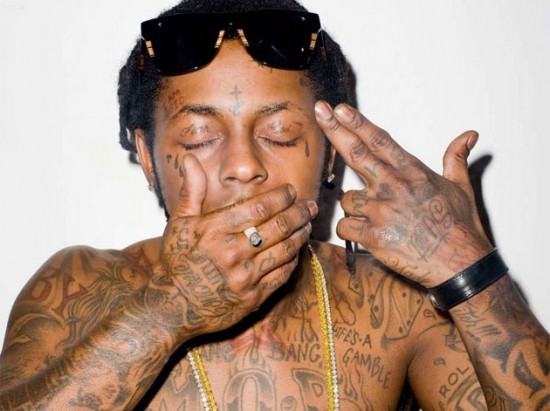
Wow. After watching The Carter, the new all-access documentary on Lil' Wayne, one might consider recommending it as the best doc about a hip hop icon ever. The problem with this superlative lies in its limitation. Similar to labeling Lil' Wayne a rapper—even "the best rapper alive" as many profess—and leaving it at that, labeling this a great hip hop doc restricts it to the confines of a niche or genre coated in personal taste and stigmas. That is to say The Carter is foremost a fascinating portrait of a remarkable, modern artist and celebrity who has cooked most if not all bridges for comparison.
In The Carter we experience the exact moment when Wayne calmly finds out, overseas and perma-high, that his latest album, Tha Carter III, has sold one million plus in its first week. As his friend and manager, Cortez Bryant, tells the camera, Wayne now indisputably ranks with the world's top pop stars; and this doc ranks with the best of the year. It's also highly difficult to cite precedent for a film so privy to a superstar's love of, and possible dependency on, drugs. Clearly, the recent, This Is It, failed in this regard.
Of course, it comes as no shock to anyone who follows current music that Lil' Wayne hearts marijuana and cough syrup, but truly witnessing his relationship with drugs to the extent that one can feel the chemistry intertwine and inspire Wayne's tireless, unorthodox creative process and fiery ethos inarguably qualifies as one. I say this as a writer who has actually interviewed him in person in a hotel room with a blunt on the table. On camera, Wayne quickly deadens an interviewer's comparison in terms of popularity to the Rolling Stones (he has business beef with them). Nevertheless, I find Cocksucker Blues, the 1972 doc on the Rolling Stones, to be an apt cinematic comparison per access to excess. Especially when comparing each doc's' stylistic preference of cinéma vérité for capturing a lavish lifestyle of touring, partying, and recording.
More reason for comparison is that the release of Blues was infamously blocked by the Stones for decades, and even with President Obama referencing him in speeches, Lil' Wayne currently faces a one-year jail sentence for a gun charge. Tellingly, Wayne is no longer endorsing the film and has attempted to block it to no avail. Minutes into the doc, after I realized the sheer number of viewers who will watch this, I subconsciously began to rethink the meaning of "pop superstar" in regard to Weezy. I've been meaning to do this, but even after his interview on 60 Minutes, it takes a hard push given the manufactured, horrible-for-pop state of pop music.
Not only is Lil' Wayne an artist whose outlaw-sensibility has a global reach, as he proclaims here, this is a rapper who sees himself as the aughts' amalgamation of Kurt Cobain and Russell Crowe's true-life schizo in A Beautiful Mind while poetically harboring a crush on Topanga from Boy Meets World. His words. Fuck a rock-doc, this is one for science.
Directed by Adam Bhala Lough, who previously helmed the Lee Scratch Perry doc The Upsetter and the indie Weapons with Paul Dano, The Carter follows Lil' Wayne on his travels in 2007 and 2008 bouncing around to Los Angeles, Amsterdam (for obvious reasons), various concerts and other locales, and on to Miami's famous The Hit Factory to record. Produced by QD3, a company founded by Quincy Jones III (son of the American producer legend), by way of sheer immediacy, The Carter surpasses James Toback's excellent doc on Mike Tyson (Tyson) from this year.
And both of these subjects share countless parallels: both are black men who grew up in lower income neighborhoods (New York/New Orleans); both were involved in crime at a young age (troubled beginnings later parlayed into commercial-savvy images); both showed tremendous promise and talent in their teens and won awards (Junior Olympics/Album Sales) to foreshadow massive success; both had priceless mentors (Cus D�


